by Borislava Manojlovic | Oct 10, 2016 | events |
Visit Bilbao, Pamplona, San Sebastian, Guernica
March 3-11, 2017
3 Credits
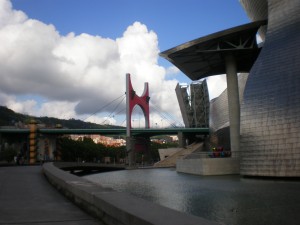
Memory and Conflict: Dealing with the Past Constructively
Instructor: Dr. Borislava Manojlovic
- Discover how different actors and institutions address processes of dealing with the contentious past through education, justice, policymaking and art
- Interact with government officials in the Basque Parliament, civil society leaders, scholars, activists and artists
- Visit cultural sights and meet local people in Bilbao, Pamplona, San Sebastian, Guernica and Vitoria
SPACE LIMITED – APPLY NOW BY DECEMBER 15, 2016
(more…)
by Felipe Bueno | Apr 20, 2016 | events, Feature Stories, Features |
The Center for Peace and Conflict Studies at Seton Hall University held a two-day conference on April 4-5 called “All Conflict is Local: Personal Experience, Reflection, and Conflict Resolution.” This conference was a unique opportunity for students studying conflict and post-conflict reconstruction to present their research to the Seton Hall community.
The conference w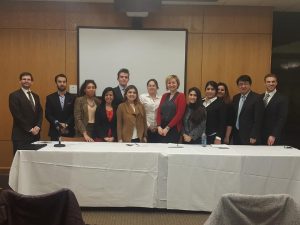 as organized by Dr. Zheng Wang, director of the Center for Peace and Conflict Studies, a specialist in global negotiation and conflict management, and an expert on the Asia-Pacific region.
as organized by Dr. Zheng Wang, director of the Center for Peace and Conflict Studies, a specialist in global negotiation and conflict management, and an expert on the Asia-Pacific region.
Dr. Wang was inspired by the Global Conflict Resolution and Peacebuilding course he is teaching this semester, and stressed to the students, “This is your conference.” He emphasized that the conflict is real for many people and there is a value in stories of conflict of those who experienced it.
The first day of presentations began with opening remarks by Dean Andrea Bartoli, who commended Dr. Wang for the creativity of the conference. Four panelists presented their work on the localized conflicts occurring in all parts of Africa. “Conversation is dangerous,” stated Dean Bartoli, “but injustices must be discussed for the sake of the victims to conflict, and for the betterment of society.”
(more…)
by Borislava Manojlovic | Apr 14, 2016 | events, Feature Stories, Features |
 The School of Diplomacy together with the Basque Government Office in NYC has launched an exhibition “Changing Perspectives” on the three decades of work of the Basque Institute for Women – Emakunde. The exhibition is included in the Seton Hall University’ Petersheim expo and it represents the School’s continued efforts to develop partnerships with academic institutions, government, think tanks and civil society of the Basque Country. It features posters depicting various campaigns and work of Emakunde.
The School of Diplomacy together with the Basque Government Office in NYC has launched an exhibition “Changing Perspectives” on the three decades of work of the Basque Institute for Women – Emakunde. The exhibition is included in the Seton Hall University’ Petersheim expo and it represents the School’s continued efforts to develop partnerships with academic institutions, government, think tanks and civil society of the Basque Country. It features posters depicting various campaigns and work of Emakunde.
Emakunde was created in 1988 as the Basque Institute for Women. It was awarded the 2015 United Nations Public Service Award for “Promoting Gender Responsive Delivery of Public Services”. As an autonomous body of the Basque Government, Emakunde has promoted and led the process of development, implementation and evaluation the equality policies of women and men in the Basque Autonomous Community 1988 including the Law for Equality between Men and Women passed in 2005. For the last 28 years, Emakunde has launched several awareness campaigns about equality between women and men in different areas of life, often making the invisible visible. The goal of the exhibition is to commemorate Women’s History Month, an annual declared month that highlights the contributions of women to events in history and contemporary society, through sharing images and messages of Emakunde’s campaigns that have helped transform the way Basque society sees and experiences the Basque Country and the world in terms of gender equality. The exhibition will be hosted by the School of Diplomacy and International Relations from April 12 -30, 2016.
by Borislava Manojlovic | Mar 22, 2016 | events |
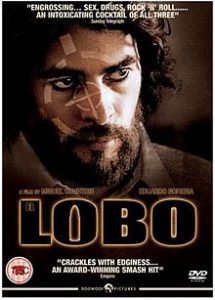 Written by Paola Ordonez
Written by Paola Ordonez
The director of the Basque Research Team Dr. Borislava Manojlovic and other six members of the team: Thomas Hill, Felipe Bueno, Gabriela Taveras, Paola Ordonez, Shahriar Chowdhury and Bryan Yeoh were hosting the event for students of the School of Diplomacy. A total of 14 attendees enjoyed the movie and the refreshments served followed by a brief discussion about the film. During the review, the students mentioned the most important moments of the movie such as the decision of the main character Txema to infiltrate ETA in order to help the Spanish Government. Dr. Borislava moderated the discussion about this film which is based on a real story and received positive opinions from the students. It was the first time for some of the students to learn about the Basque country and the past activities of ETA.
The meeting concluded with an interview conducted by the student interview producer Emily Livaudais who talked with Thomas Hill, Dr. Manojlovic and Paola Ordonez. The interview is going to be broadcasted on The Global Current Radio Station soon. We are looking forward to share the interview as soon as it is available. Dr. Manojlovic and the team are looking forward to organize more similar events to promote our work and share it with the School and beyond.
by Felipe Bueno | Mar 21, 2016 | Blog, events |
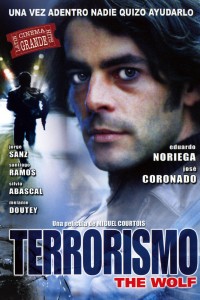 “El Lobo” is a film that beautifully melds together an artistic visual experience with a complicated, and multifaceted story about nationalism and moral ambiguity . The story involves a man, Txema, who is incredibly passionate towards his homeland – the Basque country – but due to some unforeseen circumstances he ends up being recruited by the Spanish government to infiltrate ETA. In the process he undergoes tribulations that cause him to lose his wife and question what it means to love his country. His journey makes him question exactly how far he is willing to go for his country, and he is ultimately forced to choose between what he believes is the lesser of two evils. On one hand, he must consider helping the nationalist terrorist organization ETA, whose goal is Basque independence, or the Spanish government, who wishes to suppress ETA for their own personal gain.
“El Lobo” is a film that beautifully melds together an artistic visual experience with a complicated, and multifaceted story about nationalism and moral ambiguity . The story involves a man, Txema, who is incredibly passionate towards his homeland – the Basque country – but due to some unforeseen circumstances he ends up being recruited by the Spanish government to infiltrate ETA. In the process he undergoes tribulations that cause him to lose his wife and question what it means to love his country. His journey makes him question exactly how far he is willing to go for his country, and he is ultimately forced to choose between what he believes is the lesser of two evils. On one hand, he must consider helping the nationalist terrorist organization ETA, whose goal is Basque independence, or the Spanish government, who wishes to suppress ETA for their own personal gain.
After being exposed to both sides of this war, Txema decides that the means by which ETA wishes to gain independence are too destructive and chooses to side with the Spanish government. He believes that the government wishes to put an end to the fighting for the good of the people. However, he soon finds out that the government wants to end the fighting only temporarily in order to be looked favorably upon by the international community. At this realization Txema’s world is shattered knowing that he was merely a puppet in a proxy war. After this he is hated by the members of ETA and forced to leave the Basque region, all while being dismissed by the Spanish police force. The movie’s tragic end highlights the futility of the conflict and demonstrates how people’s lives were ruined by violence on both sides.
by Borislava Manojlovic | Feb 3, 2016 | Blog, events, Research Team, Slideshow |
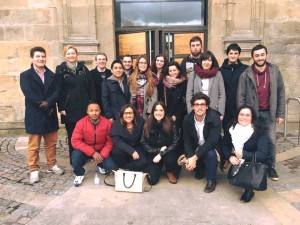 In January 2016, Dr. Borislava Manojlovic led a team of students in an immersive study abroad trip to the Basque Country, Spain. The course, titled “Memory and Conflict: Dealing with the Past Constructively,” allowed students to discover how different actors and institutions address processes of dealing with the region’s contentious past through education, justice, policymaking, and art.
In January 2016, Dr. Borislava Manojlovic led a team of students in an immersive study abroad trip to the Basque Country, Spain. The course, titled “Memory and Conflict: Dealing with the Past Constructively,” allowed students to discover how different actors and institutions address processes of dealing with the region’s contentious past through education, justice, policymaking, and art.
The Basque Country has experienced protracted conflict described as “Europe’s longest war” with roots that can be traced to the time of Spanish Civil War and before. The Basque Study Abroad trip explored the consequences of the conflict and steps that are being taken to help spur the reconciliation process.
(more…)


 as organized by Dr. Zheng Wang, director of the Center for Peace and Conflict Studies, a specialist in global negotiation and conflict management, and an expert on the Asia-Pacific region.
as organized by Dr. Zheng Wang, director of the Center for Peace and Conflict Studies, a specialist in global negotiation and conflict management, and an expert on the Asia-Pacific region. The School of Diplomacy together with the Basque Government Office in NYC has launched an exhibition “Changing Perspectives” on the three decades of work of the Basque Institute for Women – Emakunde. The exhibition is included in the Seton Hall University’ Petersheim expo and it represents the School’s continued efforts to develop partnerships with academic institutions, government, think tanks and civil society of the Basque Country. It features posters depicting various campaigns and work of Emakunde.
The School of Diplomacy together with the Basque Government Office in NYC has launched an exhibition “Changing Perspectives” on the three decades of work of the Basque Institute for Women – Emakunde. The exhibition is included in the Seton Hall University’ Petersheim expo and it represents the School’s continued efforts to develop partnerships with academic institutions, government, think tanks and civil society of the Basque Country. It features posters depicting various campaigns and work of Emakunde. Written by Paola Ordonez
Written by Paola Ordonez “El Lobo” is a film that beautifully melds together an artistic visual experience with a complicated, and multifaceted story about nationalism and moral ambiguity . The story involves a man, Txema, who is incredibly passionate towards his homeland – the Basque country – but due to some unforeseen circumstances he ends up being recruited by the Spanish government to infiltrate ETA. In the process he undergoes tribulations that cause him to lose his wife and question what it means to love his country. His journey makes him question exactly how far he is willing to go for his country, and he is ultimately forced to choose between what he believes is the lesser of two evils. On one hand, he must consider helping the nationalist terrorist organization ETA, whose goal is Basque independence, or the Spanish government, who wishes to suppress ETA for their own personal gain.
“El Lobo” is a film that beautifully melds together an artistic visual experience with a complicated, and multifaceted story about nationalism and moral ambiguity . The story involves a man, Txema, who is incredibly passionate towards his homeland – the Basque country – but due to some unforeseen circumstances he ends up being recruited by the Spanish government to infiltrate ETA. In the process he undergoes tribulations that cause him to lose his wife and question what it means to love his country. His journey makes him question exactly how far he is willing to go for his country, and he is ultimately forced to choose between what he believes is the lesser of two evils. On one hand, he must consider helping the nationalist terrorist organization ETA, whose goal is Basque independence, or the Spanish government, who wishes to suppress ETA for their own personal gain. In January 2016, Dr. Borislava Manojlovic led a team of students in an immersive study abroad trip to the Basque Country, Spain. The course, titled “Memory and Conflict: Dealing with the Past Constructively,” allowed students to discover how different actors and institutions address processes of dealing with the region’s contentious past through education, justice, policymaking, and art.
In January 2016, Dr. Borislava Manojlovic led a team of students in an immersive study abroad trip to the Basque Country, Spain. The course, titled “Memory and Conflict: Dealing with the Past Constructively,” allowed students to discover how different actors and institutions address processes of dealing with the region’s contentious past through education, justice, policymaking, and art.